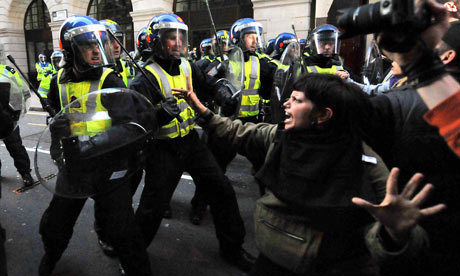While Washington politicians dispense the citizens’ money, the people of England have become familiar with a far more immediate and tangible form of disregard for private property.
The London Metropolitan Police’s shooting of 29-year-old Mark Duggan, a passenger in a vehicle police stopped on Aug. 4, ignited days of rioting and looting that quickly spread from London to cities across the country. Police initially said Duggan fired at officers, but they have since acknowledged the bullet actually came from a police officer’s pistol.
Any semblance of political purpose in the demonstrations rapidly disintegrated into pure criminality.
The British press and political establishment have been abuzz with attempts to explain and rationalize these events. Figures on the political left, such as London’s former mayor Ken Livingstone, blame the government’s cuts to state social and educational spending, most of which have yet to take effect. Social conservatives point to the disintegration of the traditional family and school discipline. Other accounts paint the riots as the inevitable reaction to the leniency of Britain’s police and criminal justice system, or the ever-present problems in English race relations.
Motivated by Property, Not Politics
The character of the riots indicates a more disturbingly flawed society. Far more quickly than in the 1992 Los Angeles riots, which were sparked after the airing of video showing police beating motorist Rodney King after a high-speed chase, the London riots’ pseudo-political inciting incident was virtually forgotten.
Organized violence against the establishment or between ethnic, ideological, or economic groups was surprisingly rare. Instead, the rioters almost exclusively engaged in looting, arson, vandalism, and other crimes against property. Their principal motivation appears not to have been the violent expression of political grievances but the mere opportunity for material gain and entertainment at the expense of others’ property. Historian David Starkey described it on the BBC’s “Newsnight,” as “shopping with violence.”
Many British commentators were quick to draw the link between last week’s violence and the expansive British welfare state. The British system of social healthcare, housing, and benefit payments has undoubtedly created a depth of welfare dependency unrivaled on this side of the Atlantic.
To paraphrase these voices on the British right, “How could those raised in a society where the government provides everything down to the smartphones used to coordinate the looting, for whom the provision of a living is an unalienable right rather than something to be earned, possibly not feel entitled to steal and destroy when the opportunity presented itself?”
Intergenerational Unemployment
Welfare dependency itself is just one aspect of the British underclass. Equally important is the long-term unemployment to which “the dole” contributes. A “welfare trap” is often discussed in the United States, but in Britain the problem has reached a startling proportion. Together with a historically weaker economy it has given rise to widespread, permanent, and intergenerational unemployment.
For many young, poor Britons, perhaps second- or third-generation unemployed, the prospect of legitimate employment or departure from state-owned housing is not even an aspiration. It is economically irrational and, from the perspective of their community, alien. That employment has become exceedingly difficult in today’s economic slump certainly does not help matters.
Thus has arisen something the United States, with its relatively robust economy and sparse welfare state, has heretofore been largely able to avoid: an underclass alienated from capitalism and unconnected to its moral emphasis on private property.
Although this underclass provided the tinderbox for the recent unrest, its members by no means made up the entirety of the looters. Even less does their alienation represent the entirety of British youth’s antagonistic relationship with property rights.
Employeds’ Participation
Included in those arrested are scores of employed young people and comfortably middle-class students. In two of the more shocking cases, Laura Johnson, the 19-year-old university-student daughter of a marketing company director, and Chelsea Ives, an 18-year-old “Olympic Ambassador” for the 2012 London Games, have been charged respectively with stealing televisions and destroying a phone shop.
Britain has raised a generation, not just a class, with a diminished respect for other peoples’ property. Across the socioeconomic spectrum, the idea pervades among the young in Britain that crimes against property are somehow not truly crimes, that in certain circumstances they can be mitigated or even justified.
Disrespect, Disparagement
Last year, when overwhelmingly middle-class students vandalized and “occupied” some of the most storied businesses in London during protests against education cuts, they demonstrated they considered political expression, however unrelated to the issues at hand, to be among these circumstances. In these most recent riots, the mere unlikelihood of being caught and punished was enough for English youths of widely varying backgrounds to abandon any semblance of respect for their neighbors’ belongings.
It is hardly a stretch to suggest decades of socialist policies and their accompanying private property-disparaging morality played some role in fomenting these attitudes.
If the riots in England show anything, it is that if long-term unemployment becomes a permanent facet of American life, if we allow the rise of a dependent underclass, and if we fail to instill in the nation’s youth our system of morality with its emphasis on the sanctity of private property, U.S. taxpayers may soon have far greater and more immediate problems than fiscal irresponsibility in Washington.
Ian Mason ([email protected]) lived and studied in the United Kingdom and recently returned to Chicago.




